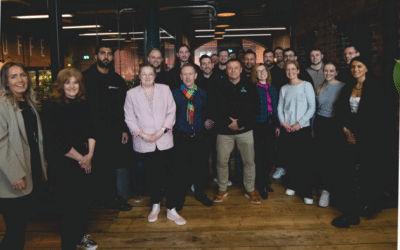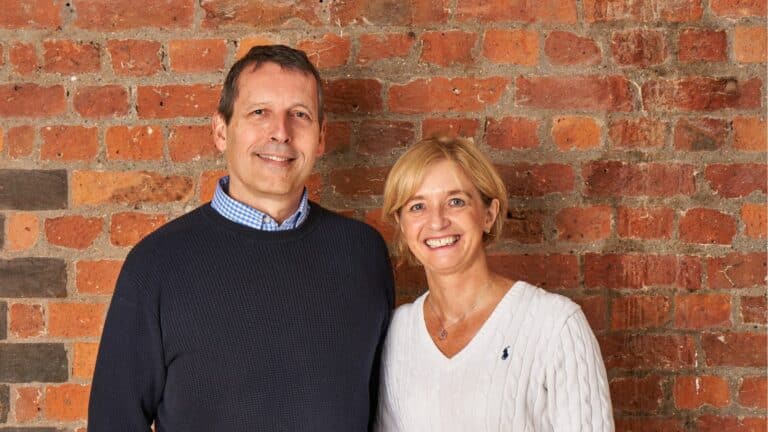Desperately clutching a toilet bowl in a hotel room in Moscow, months of complex health issues finally caught up with former Kellogg’s director, Ian McCartney.
“I could not get off the floor“, he tells Prolific North. “The last place I wanted to die was in Russia.”
At least once a week in the months leading up to his work trip, he had already been struggling with his vision in one eye.
“When I finished work for Christmas, I was sitting at the table and couldn’t see a thing. I’d lost my eyesight. I felt dreadful.”
It was all thanks to a bite from a tick in the Lake District, where he unknowingly contracted Lyme disease.
“I didn’t have the rash, so I didn’t do anything about it,” he says. “I didn’t know anything about Lyme disease or ticks, so we just ignored it.
“I tried to carry on working but I was getting worse and worse. In 2012, it came to a head. I thought I was going to die unless I stopped working for a short period of time to get better.”
Facing a battle with his health, and grappling with his new diagnosis which he says was seen as “controversial”, after the Moscow trip he asked Kellogg’s for some time off work.
“I was still really really struggling,” he says. “They gave me three months off work, which was really kind of them, and it turned into two and a half years trying to recover.”
During that time, he had unknowingly stumbled on a great idea that would soon enough become his full time job.
“We could really do something here”
Cobbling together pieces of different games found around the house, alongside his wife Lisa McCartney in 2008, he came up with a way of making maths fun for their children.
“Within about three or four months, the school asked my then five-year-old daughter about an improvement in her maths, and asked what she was doing.”
The school asked the McCartney’s to bring the game in, but they refused as it was just a piece of laminated piece of paper at that time.
“Normally if you play a maths game, the best player is always going to win. In our game, you could play at any age, any ability, and compete against each other so it was trying to level the playing field.”
Three months into being off work unwell, his wife Lisa was also at home looking after the children. “When I stopped working things became a bit tighter financially, without a shadow of a doubt.”

Despite still struggling with his health, he was fed up with sitting around and “doing nothing”. While Lisa took their children to school, he made prototypes for the game and she took them into a local primary school.
Inspired after the headteacher said “every child in school should have this game”, the duo developed it as a maths focused numbers board game called PLYT Games.
They were soon in demand. Schools asked them to run sessions, and they eventually sold over 10,000 copies of the game.
“I remember feeling really unwell, stood at the back of the room and Lisa was showing them how you play. Four schools in the area and children were there. You could hear a pin drop for the first five minutes.
“Then all of a sudden, the whole place comes alive, even though they’re playing a maths game. The kids didn’t want to finish. So they had to set up another room somewhere else for the kids to finish the games, because they were so keen on competing.
“The parents of the child who won came up to Lisa the next day and said he couldn’t stop talking about it. He hated maths but when he suddenly won this maths game, was absolutely thrilled. It was then that we realised, actually, we could do something with this if we tried.”
Around 2015, It was time to head back to work after more than two years away.
“Things had changed with the company, and things had changed with me. I still wasn’t particularly well, but I was a lot better than I was. I just realised we could do more by helping kids learn maths. So I stopped working at Kellogg’s.”
AI, the evolution of Plytime and the future
A photo memory flashed up on his phone of a boat trip to the Bosporus when he was there for a board meeting. Fast forward to being sat on a tiny school chair in a school corridor, it may seem like a mundane transition to some, but he couldn’t have been happier.
Trialing more than 30 tutoring games with a researcher in the Midlands, the duo began piloting the game across schools and in sessions with children learning maths.
During the trial, they soon discovered lots of parents are unable to afford tutoring, the range of abilities within a class at school is “astronomical”, and learning times were lengthy.
They stopped the sessions, realising they could “reach a lot more people” online and set about creating Plytime Learning. When Covid hit, it presented an opportunity for them to partner with The Startup Factory in Manchester to build a rough MVP of the platform.
“The mission behind Plytime is we want to help every child to be their best. It’s not about being the best, it’s about being at their best, regardless of their age, ability, or their background, and we want to do that through personalised learning so every child has the support they need.”
While tutoring sessions may typically last one hour, the McCartney’s believed one-to-one support was best in 15 minute chunks thanks to increasingly short attention spans.

“It enables people to have long-term support at a much cheaper rate, because they’re not paying for a full hour and it allows people to do it in small chunks.”
When the platform was nearing completion, the duo teamed up with Manchester Metropolitan University (MMU) on a research project.
Across a six-week study, they discovered 91% of primary aged children who received Plytime’s online Focus Tutoring showed a significant improvement in maths – up by 27% – compared to the control group by learning in shorter, 15 minute chunks.
“After we proved 15 minutes was significantly more effective than 45 minute long sessions or above, that was really the big first step of our journey with Plytime at the end of 2022. There’s no other platform that connects all the stakeholders together with one-to-one tutoring for 15 minutes.”
The online edtech platform has since evolved, providing students with 24 hour access to personalised digital content, video-enabled one-to-one tutoring in 15 minute chunks, and is gamified with access to rewards and competitions for all ages and abilities to compete against each other. Children can learn at their own pace, and it also connects schools, parents and tutors together in one place.
It’s set to be a busy year for the McCartney’s after securing a £205,000 Smart Grant, co-funded by the UK’s innovation agency, Innovate UK last year.
The grant will be used to develop and integrate a bespoke AI-tutor prototype into the platform, focused on providing support to students quicker than waiting for human intervention.
Plytime is set to collaborate with AI experts Inevitable for the project, with both businesses meeting as part of the Exchange tech scale-up programme based at Department Bonded Warehouse.
“We know two of our 15 minute sessions are more effective than an hour of traditional tutoring, so if we can get two of those sessions down to one because the AI tutor is doing some of that work for them, that’s even more affordable.
“The idea is not to have AI tutoring just sat there. We hope that can make it more efficient, more cost effective.”
He has big ambitions to work with celebrities or role models, and integrate them into the rewards part of the platform too.
“Students earn tokens that they can exchange for rewards. Imagine a child’s reaction if a 32 second video of Marcus Rashford came up and said well done – role models could play a real part in this.”
Although the platform currently focuses on maths, the duo hope to raise investment of £750,000 to £1m so they can expand the platform into more subjects in future.
“Private tutoring exists because we don’t get it right at school. We don’t get it right at school, because schools are designed for mass learning. Now with technology, imagine if we can get students to learn the curriculum in about 25% of the time it takes them to do it. It would leave time for children to develop in lots of other areas.
“I think the platform could change the way we teach at school with the right investment and backing.”












